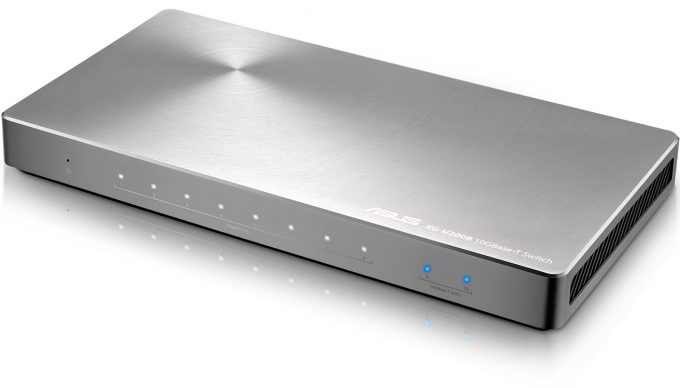- Qualcomm Launches Snapdragon 4 Gen 2 Mobile Platform
- AMD Launches Ryzen PRO 7000 Series Mobile & Desktop Platform
- Intel Launches Sleek Single-Slot Arc Pro A60 Workstation Graphics Card
- NVIDIA Announces Latest Ada Lovelace Additions: GeForce RTX 4060 Ti & RTX 4060
- Maxon Redshift With AMD Radeon GPU Rendering Support Now Available
ASUS’ XG-U2008 Switch Helps Make 10Gbps Networks More Affordable
One of the constant thorns in my side in computing over the past couple of years has been the fact that 10Gbps Ethernet is still not common in the home. Heck – its use could barely be measured, simply because 10Gbps gear costs so much. In effect, if you happen to enjoy a 10Gbps network at home, chances are good that you either need it, or you happen to have a lot of disposable income (in which case, congrats!)
ASUS cares a lot about getting 10Gbps Ethernet into the hands of more and more people, and while its solutions are still on the expensive side (versus 1Gbps equipment), what we’re seeing is a major step forward. Next year, or perhaps in a couple of years, we might very well see a lot more 10Gbps in the home – at least, for the enthusiasts (grandma might not need a 10Gbps pipe for email).
So what’s ASUS gone and done? It’s released the XG-U2008 switch, one powered by Marvell’s 88E6190X and 88X3220 PHY transceivers to offer two 10Gbase-T ports and eight 1Gbps ports. At $249, it’s very tempting.
Who would benefit from a product like this are those who transfer lots of data (eg: uncompressed 4K video) often, either to another computer, or to network-attached storage. 10Gbps is equivalent to 1.25GB/s, so the storage on both ends is going to have to be super-fast – we’re talking PCIe-level fast (or SATA SSD RAID fast).
ASUS notes that the ports on the XG-U2008 can configure themselves as WAN or LAN automatically. As seen in the shot above, it also has status lights for every single connection in the front, helping you diagnose a bad connection easily, or simply check to make sure everything is running smoothly.
If you’re salivating over the XG-U2008, you should be happy to know that this is one of those rare times when there is no waiting period for the product to arrive. The XG-U2008 is available right now at Newegg. Need a motherboard with 10Gbps support? ASUS even has that covered. Admittedly, that board is far from inexpensive, so if you need to skip over that, you can peruse Amazon for a variety of 10Gbase-T PCIe cards for much cheaper.






